This post contains affiliate links from which I may receive a small commission, at no extra cost to you. In no way does this affect my opinion or the information I provide on the product. Please read my disclaimer for more info.
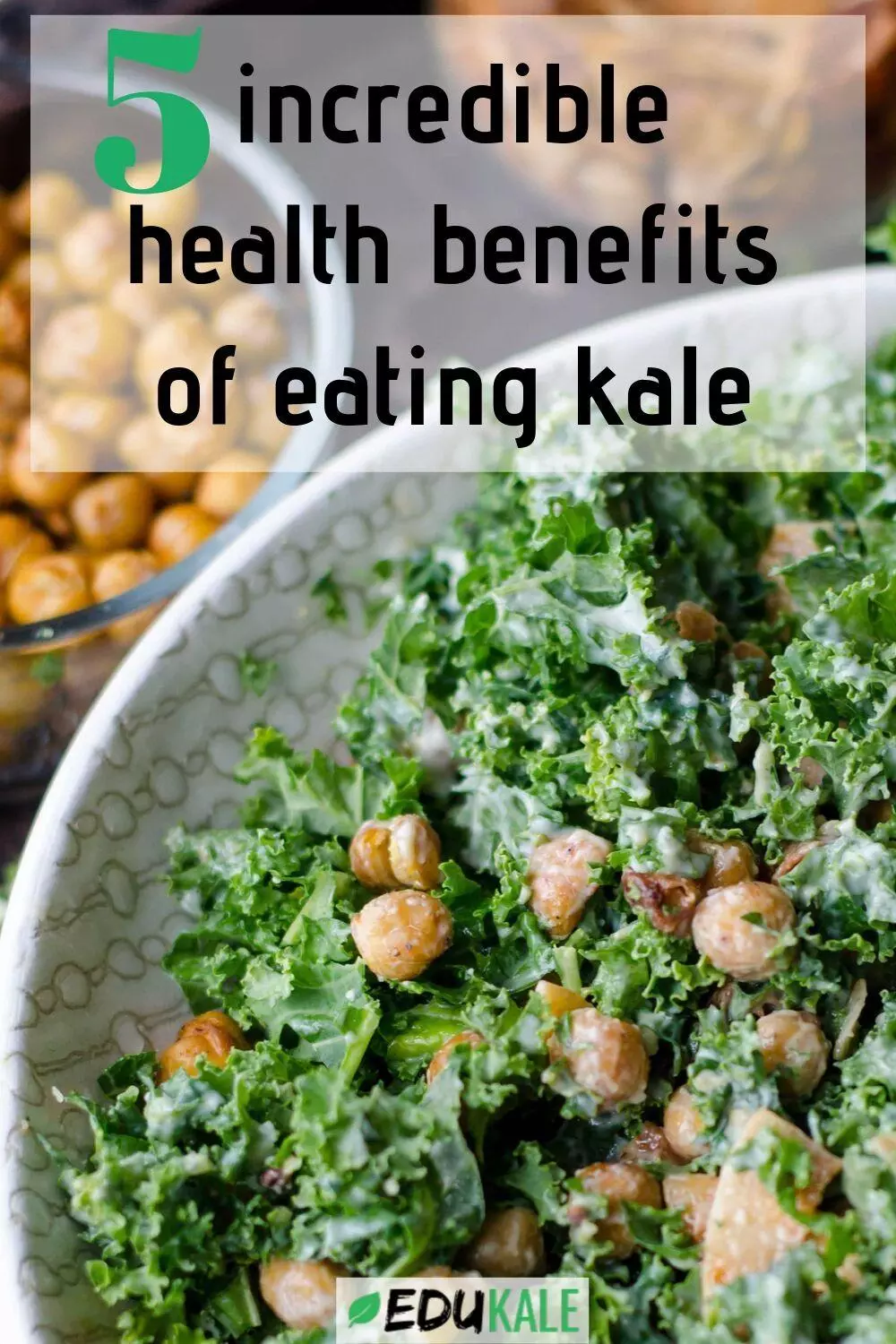
There’s a reason why kale has a place in this website’s name- it’s packed with incredible health benefits!
Kale chips, kale smoothies, kale soups, kale salads, or even a full-on kale meal, there are many different ways to include this nutritional powerhouse into your diet.
What is kale?
First of all…what is it? Kale is a leafy green vegetable from the cruciferous vegetable family. It’s related to vegetables such as cabbage, cauliflower, broccoli, and Brussel sprouts.
There are many types of kale: curly, purple, baby, dinosaur…The one most commonly found in grocery stores is curly kale. Kale has a high concentration of vitamins and minerals and is a very nutrient-dense food. This makes it a food with many great health benefits…
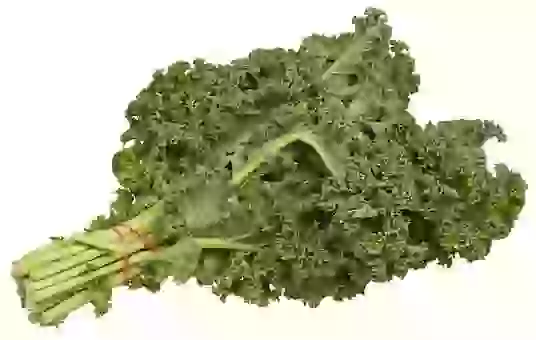
Incredible health benefits of kale
1. Kale is packed with vitamins
Kale contains great amounts of many different vitamins. For one cup (around 67 grams) of raw kale, you get…
A lot of vitamin A, specifically 515 micrograms of retinol and 6182 micrograms of beta carotene.
These are the two major components of vitamin A, and studies measure them separately. This accounts for 206% of the recommended daily value.
This vitamin is essential for protecting your eyes and plays a role in maintaining good skin and a healthy immune system.
80.4 milligrams of vitamin C, which represents 134% of the daily value. It’s an antioxidant, helps with iron absorption, makes collagen, and boosts the immune system.
547 micrograms of vitamin K, which makes up 684% of the daily value (DV)! This vitamin is important for blood coagulation.
19.4 micrograms of vitamin B9, or folate, which makes up 5% of the DV. Folates are important for making new DNA and red blood cells.
Doctors often recommend pregnant women to increase their B9 intake, as it helps prevent birth defects and promotes healthy brain development in babies.
Kale also contains many other B vitamins, such as B1, B2, B3, and B6. They are all important for energy metabolism and one cup of kale covers around 5% of the DV for each vitamin.
2. Kale is loaded with minerals
Kale is also filled with different minerals. For one cup (around 67 grams) of raw kale, you get…
90.5 milligrams of calcium, which is 9% of the DV. Calcium is crucial for building and maintaining strong bones and teeth. It also regulates muscle contraction and enables good communication between our brains and organs.
In addition, calcium is essential for the normal functioning of many enzymes.
1.1 milligrams of iron, which is 6% of the DV. Iron is important in the making of red blood cells, which bring oxygen to all the different organs. As a result, it prevents anemia and general fatigue.
22.8 milligrams of magnesium (6% DV), which helps convert our food into energy by controlling its biochemical reactions.
299 milligrams of potassium (9% DV), which helps control the body’s fluid balance.
0.2 milligrams of copper (10% DV), which helps produce red and white blood cells and is important for brain development.
0.5 milligrams of manganese (26% DV), which helps activate the body’s chemical reactions.
3. Kale is filled with antioxidants
Kale has high antioxidant activity. Antioxidants are molecules that help eliminate free radicals from your body. Even if these free radicals are natural byproducts of your metabolism, having too many of them can cause oxidative stress in your body.
Antioxidants in kale neutralize them to help protect your cells and body function and prevent diseases. Kale contains antioxidants such as vitamin C, beta-carotene, flavonoids, and polyphenolic compounds.
However, cooking kale lowers the antioxidant activity so it’s recommended to eat most of it in raw form.

4. Kale may protect you from diseases
Cancer:
Kale, like other cruciferous vegetables, contains components with therapeutic potential for both cancer prevention and cancer treatment.
As a matter of fact, it contains indole-3-carbinol, and studies show that it is well known for its anti-cancer properties. Its dimeric product has human anticancer activities as well.
There is certainly a positive correlation between cancer prevention and the consumption of cruciferous vegetables such as kale, but all the underlying mechanisms aren’t completely understood.
Cholesterol:
A study showed that drinking kale juice daily increased the “good” HDL-cholesterol by 27%, and lowered the “bad” LDL-cholesterol by 10%.
HDL-cholesterol transports the excess cholesterol out of your arteries, while LDL-cholesterol builds up in your arteries and forms plaques.
These plaques can prevent correct blood flow and lead to heart diseases. Therefore, kale contributes to reducing the risk of coronary artery disease for men (this study was done on men) with high cholesterol levels.
Diabetes:
Being high in fiber, magnesium, and vitamin C also makes kale a good candidate for protecting you against type 2 diabetes.
As a matter of fact, studies show that type 2 diabetes is often associated with deficits in magnesium. In addition, a study showed that vitamin C helps reduce blood sugar levels and has potential effects in reducing inflammation in diabetic patients.
Finally, fiber can slow the absorption of sugar and improve blood sugar levels. Indeed, a review of studies showed that people who consumed high amounts of fiber had lower chances of developing type 2 diabetes.
5. Kale has good omega-3 fatty acids
One cup of raw kale has 121 milligrams of “good” omega-3 fatty acids and 92.4 milligrams of omega-6 fatty acids. That’s a ratio of 0.76 omega-6 to omega-3, and human beings evolved on a diet with a ratio close to 1.
In contrast, the average Western diet ratio is around 16/1: it has way too many omega-6 fatty acids and not enough omega-3. This can promote diseases such as heart disease, cancer, and autoimmune diseases.
On the contrary, a low ratio of omega-6/omega-3 prevents those same diseases.
In other words, eating more food with a low ratio, like kale, and fewer processed foods with a high ratio contributes to the healthy balance of your fatty acid intake. This will help you prevent inflammation and diseases and stay healthy.
Are there any risks to eating kale?
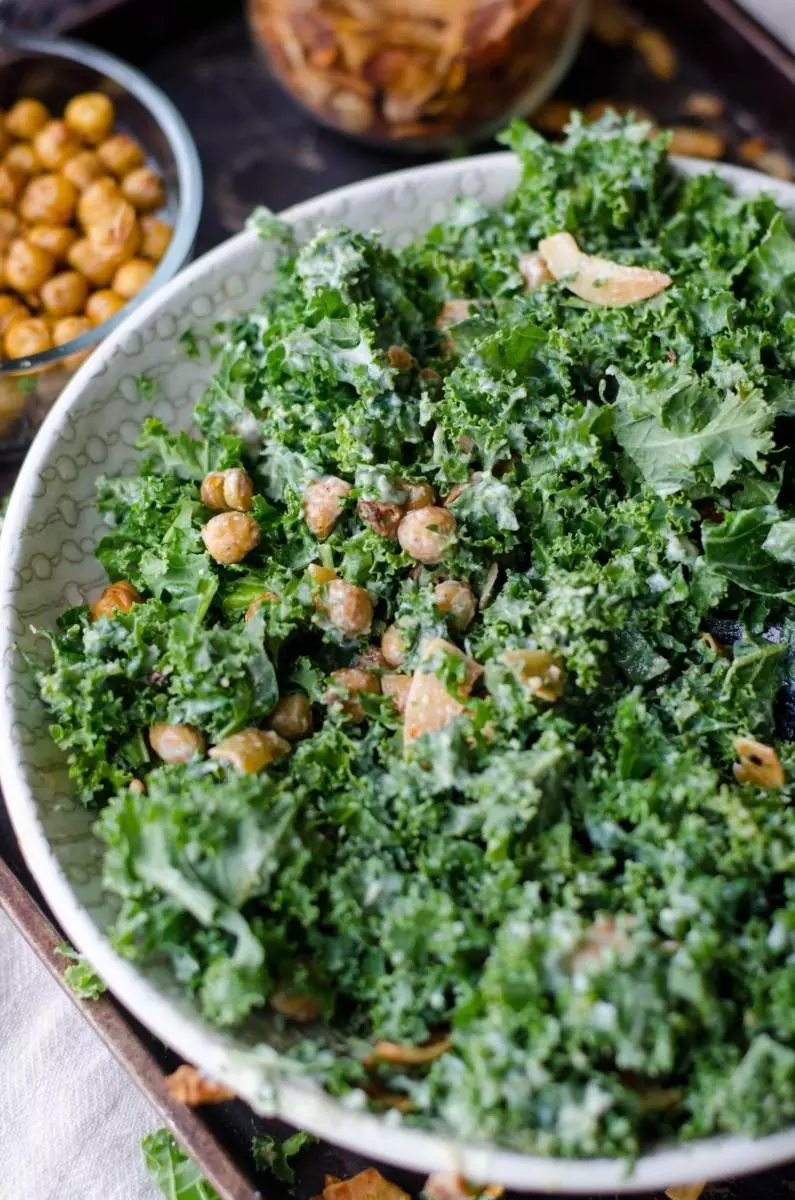
As mentionned previously, kale is very high in vitamin K, which helps your blood clot. If you are taking anticoagulants, you should try to limit your kale intake.
In addition, some people are on the fence about eating kale because they’re afraid of its thallium content. While a few articles did come out on the subject, they were not based on peer-reviewed research.
Instead, they put forward the small-scale experiments of an unaffiliated scientist. He indeed showed a correlation between the frequency at which people consumed kale and the amount of heavy metals found in their bodies.
However, correlation isn’t causality, and the results shouldn’t be extrapolated to the general population.
Much further research should be done before drawing any conclusions. For now, you’ve hopefully learned that kale is full of health benefits and should most definitely be incorporated into your diet.
Kale in conclusion…
Kale is a power-food with many incredible health benefits. It’s full of great nutrients, vitamins, minerals, and antioxidants, and helps prevent diseases. Whether it be in salads, soups or smoothies, kale should always have a place on your plate! If you’re not a fan of the taste but still crave the benefits, don’t hesitate to use kale powder— this one is made from pure, organic kale and filled with nutrients! Sprinkle it in soups, smoothies, salads, or any dish you want!
-Lucie
Do you like kale? What is your favorite way to eat it? Do you have any great recipes to share?
More references used:
Vitamin health benefits
Vitamins and minerals
Vitamin B12
Calcium
Antioxydants and nutrients in kale
Omega-6/omega-3 ratio
If you’re interested in nutrition, its impact on our health, and the science behind it, you should definitely read How Not to Die. In this book, Doctor Michael Greger, founder of Nutrition Facts, examines the top causes of death in America and explains how your diet can prevent— and in some cases even reverse— them. His advice is all backed by science and he writes in a very clear and entertaining way. This book isn’t a list of what you already know. It will teach you the keys to living a long healthy life, in a simple and practical way, and without spending fortunes on supplements and pills!
PLUS if you want to take it a step further, you can check out the How Not to Die Cookbook to implement the advice easily!

Welcome!
I'm Lucie, the nutritionist behind Edukale! If you'd like to learn more about me, click HERE !
Read More!
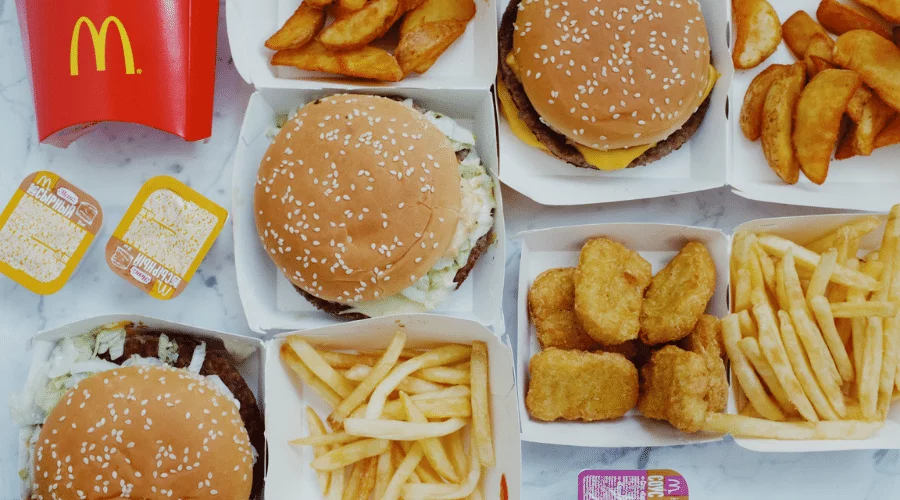
The truth about processed foods
You’ve probably heard that it’s best to reduce your intake of “processed foods” for healthy eating, and increase your intake of whole foods for optimal health.

The Best Foods to Fight Fatigue
Do you feel like you’re always tired and that you need multiple coffees to get you through the day?
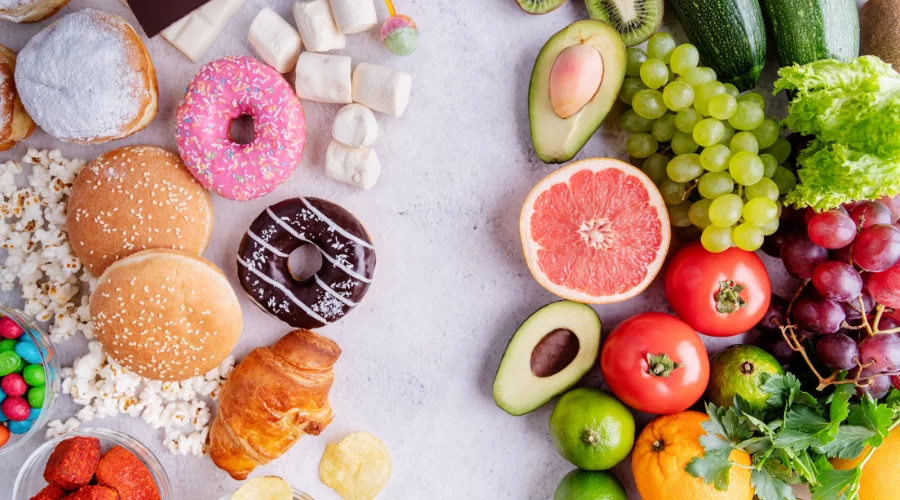
how to find the balance between healthy eating and dieting
It can be hard to find the right balance between healthy eating and dieting without becoming obsessed with food.
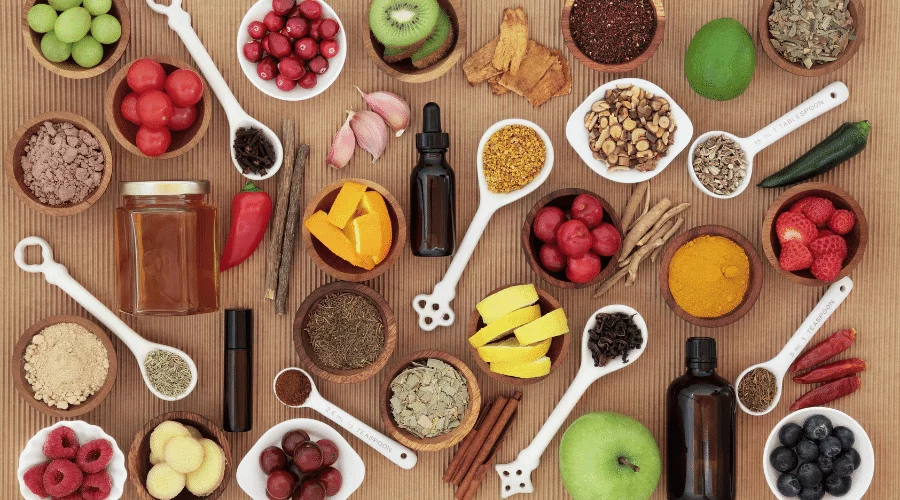
Can you use food as medicine?
“Let food be thy medicine, and let medicine be thy food.” We’re all familiar with this quote attributed to Hippocrates, and we all know the huge impact our food choices have on our health.

How to finally stop overeating for good!
Overeating means eating past your body’s actual needs, and it can be rather uncomfortable.
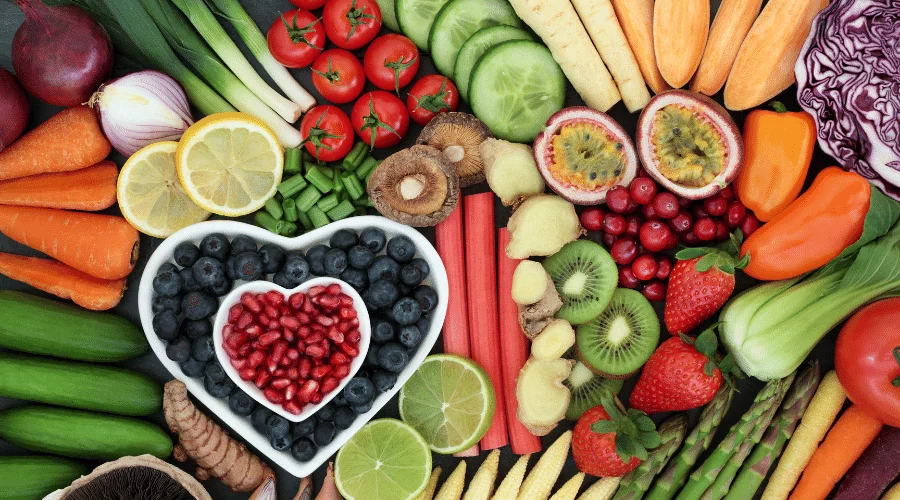
The anti-inflammatory diet: get rid of inflammation
You’ve certainly heard about the anti-inflammatory diet before and the benefits it could have on your body.
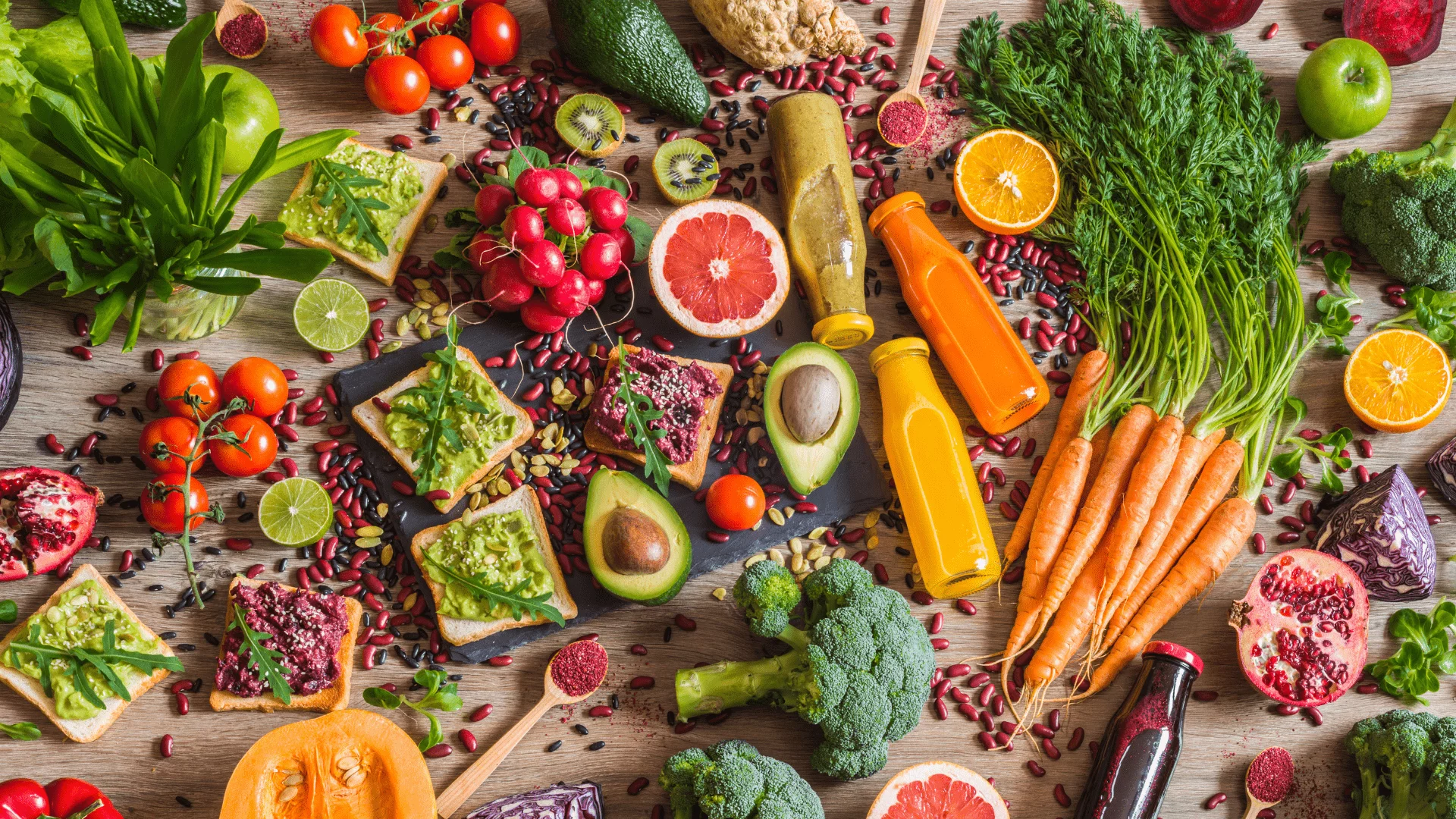
The complete beginner’s guide to veganism
Even though you can absolutely be healthy on a diet that includes animal products, the scientific consensus shows that increasing your consumption of plant-based foods is what is best for health.

Physical vs emotional hunger—learn the difference
You may be aware that physical hunger is not the only type of hunger that exists. There are actually two main types of hunger: physical hunger and emotional hunger


